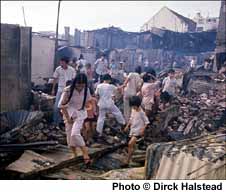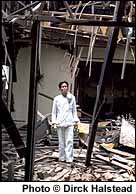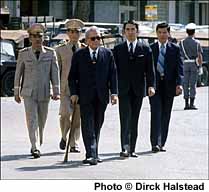CHAPTER 5 ANYONE WHO MAKES AN HONEST LIVING CAN STAY
APRIL 27 - SAIGON, THE PALACE HOTEL
I'm feeling the brandy. I pull a “33 Beer” from the mini-bar. I still have half of the Romeo and Juliet Cigar from the Majestic. I sit down on the bed, and begin writing caption envelopes that will be sent with my film tomorrow to New York. I walk over to the fridge, pull another small bottle of Cognac from it and add a little soda. I turn off the air conditioner, and open the window. With the curfew enforced, the city streets are nearly absent of sound. I realize that I have never experienced Saigon like this. It must have been quite similar to this back in the ‘20s, before all the cyclos, lambrettas and little yellow and blue taxis swarmed the streets. I look out at broad city streets. They are deserted. When the French drew up the plans for Saigon, they envisioned it this way - broad, tree-lined boulevards. It really was the Paris of the Orient. I pick up my cameras and start to clean them. The red dust has found its way into every part of the camera. I try to clean the viewfinders with my T-shirt. I really should try to make the trip up Highway 13 one more time. Maybe in the morning. David Kennerly picks me up at the curb in a Caravelle hotel car. We have decided to do a "safe" trip to the front. Leon Daniel occupies the back seat. Along Highway 13, twenty-five miles north of Saigon, we enter the beginning of no-man's land. We slip our flack jackets over our shoulders, and duck down inside the car. The driver floors it, and we bolt through "rocket alley," just as, sure enough, a couple of NVA rockets whiz by overhead. We join up with an ARVN company moving North. We take pictures of the troops and their armor moving up the highway, then stop to eat some of our picnic lunch from the Caravelle. As we nibble on the sandwiches, dark rain clouds start to move in. As the first drops of rain start to fall, a round from an AK-47 cracks through the air by my head. I can feel the air move. Suddenly, the tree line erupts in fire. Our hotel car spins around and tears back down the highway, leaving us behind. Large artillery shells, 105-mm rounds start to fall around us. I see an APC with its back hatch open. I make a run for it through the driving rain. I slam the door closed behind me. In a corner, a figure is collapsed,
smoke rising from the body. I look down…it seems to be a photographer.
His Nikon F is lying on the floor, the body smashed. I try to reach for
it. It is so hot, I have to drop it. Outside the dimly-lit APC, I can hear
shells finding their range. My eardrums pop. A phosphorous grenade goes
off inside the APC. The din is incredible. The phosphorous rises into the
air, and floats down like flakes of snow, except where they fall they burn.
I see my skin catch fire, but strangely I can't feel any pain. The
artillery shells and rockets are targeted on me. They are getting closer
and closer...
THE PALACE HOTEL
I wake up, with my t-shirt drenched in
sweat. The air conditioner has stopped working. Suddenly, there is a jolt
as a rocket falls just outside the window. Debris fills the air. I hear
sirens. I run from my room and down the stairs to the street. Explosions
are lighting the sky. There is fire coming from the roof of the Majestic
Hotel, just a block away. I fight my way through panicked people whom had
been sleeping on the grates to the front of the hotel. Nik Wheeler calls
down to me from the second floor. I run up the stairs. Behind him is the
presidential suite. The suite has a gaping hole in its roof and smoke is
rising from the room. Amidst the debris, we can barely make out a body.
Lying atop a blood-soaked I-Ching symbol on what was to have been the Vietnam
peace talks table is the body of the night watchman.
SAIGON'S CENTRAL MARKET
A lone cross, 20-feet high, the church surrounding it reduced to rubble, dominates a scene of horror. An area two blocks long and a block wide has been devastated in an early morning rocket attack and ensuing fire. Medical personnel pull a corpse from the still smoking rubble. Women walk through the debris, crying softly into handkerchiefs. Occasionally, someone will find a child's body in the wreckage, and start to wail. As I take pictures, I notice a pretty TV reporter I have never seen before, wearing a print blouse, skirt and boots. She looks out of place as she shoots her standup in the midst of the debris. ABC's Hillary Brown has just arrived in Vietnam. She has been covering the bombings in Northern Ireland. She is no stranger to this kind of scene. As she wraps her standup, she is saying "This is the first time communist rockets have landed on Saigon since 1968. For the residents of this city, it has been hard to imagine that enemy forces are now just outside the limits. They realize now that this may be just the beginning of the final act in this war."
THE NORTH VIETNAMESE COMPOUND AT TAN SON
NHUT
Despite the fact that Saigon is now under attack, with armies poised on its outskirts, the communist cease-fire observers from Hanoi, are holding their regular Sunday press conference. Due to the Paris Peace Talks, the airport has become the venue for this briefing. Tucked away in a back corner of the sprawling former American air base, a compound is sheltered by tall palms. North Vietnamese soldiers, pith helmets on their heads, and AK-47s on their shoulders, patrol the perimeter or stand impassively. A group of American correspondents and TV crews file into a long Quonset hut for the morning briefing. At the far end of the room, a large Viet Cong flag, half red, half blue, with a big yellow star in the center is hanging on the wall. At a green felt-covered table under the flag, the chief spokesman, Colonel Ba, is answering questions. At the sides of the room, which is growing steadily hotter from the TV lights, North Vietnamese soldiers serve a steady stream of cokes, orange drinks and Vietnamese beer to the thirsty newsmen. Hillary Brown asks Col. Ba, "What are the chances now for a negotiated settlement with the Saigon government? Will the new President Huong be acceptable to the communists as part of a concillation government, now that President Thieu has left?" Ba shakes his head gravely and answers, "Messieurs Huong et Thieu sont bonnet bleu and bonnet blanc." (Tweedledee and Tweedldum) The main question asked repeatedly by the press is what will happen if they stay when the North Vietnamese take the city. Will they be safe? All of us are trying to figure out our chances in the days ahead. Smiling, Ba replies "Anyone who earns an honest living will be welcome."
SAIGON, NATIONAL ASSEMBLY BUILDING
A South Vietnamese honor guard, in crisp
white uniforms, their helmets of shiny chrome reflecting the scorching
sun, are standing at attention in front of the flag bedecked National Assembly
building by the Saigon waterfront. TV crews scurry to cover the arrival
of delegates. There is Nguyen Cao Ky with his beautiful and diminutive
wife, Mai, a former Air Vietnam stewardess. Big Minh, who had his
brief time in power as president also arrives. Finally, with drum rolls
and a blare of trumpets, a long black Mercedes pulls up, surrounded by
M-16-toting security forces. President Huong, who has been in office for
the past 24 hours, stops in front of the flags to take his honors. The
Vietnamese national anthem plays. Slowly, he turns, and one-by-one, climbs
the steps to the Assembly to resign, his short presidency over.
|



